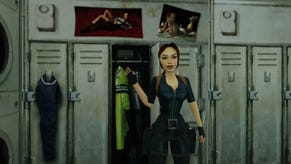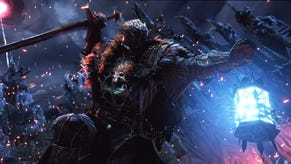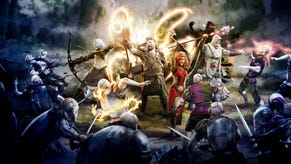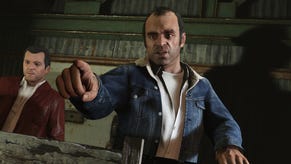Former Fable: The Journey developer unveils motion control fighting game Kung Fu Superstar
Ex-Lionhead programmer "trying to make that science fiction wet dream" a reality.
A former Fable: The Journey developer has unveiled motion control fighting game Kung Fu Superstar.

Kostas Zarifis, who worked at Lionhead for five years on Fable 2, Fable 3 and Fable: The Journey before leaving in May 2011 to found his own Guildford independent developer Kinesthetic Games, is in discussions with interested parties on a publishing deal for the game, which is still in the early stage of development.
Kung Fu Superstar sees players assume the role of budding martial arts fan Danny Cheng, who dreams of being the next Bruce Lee. The player learns real Kung Fu moves in Danny's local dojo before hitting Hollywood and strutting their stuff on film sets.
While the game does not have a confirmed platform, Microsoft's motion sensing controller Kinect is a likely destination - indeed Zarifis has focused much of his time on the game with the device.
In the case of Kinect, Kung Fu Superstar works similarly to Dance Central, in that real Kung Fu moves must be performed to the satisfaction of the game's sensors in order for successful avatar progression.
The game is designed for "real gamers", as Zarifis calls them. It's not a motion controller exclusive game, either. You'll be able to play with a controller, with a motion controller, or a combination of the two.
It's the latter that Zarifis is particularly excited about.
"We're trying to be innovative with this game across many different fronts," he told Eurogamer. "We think no-one's solved the problem of enticing true gamers to the motion control platforms. That's a multifaceted problem. It's also the way developers are asking traditional gamers to take that leap. Suddenly you have this massive new thing and a massive shift into interacting with your games. Instead of going, how about you try this bit by bit, and you can still use everything you know from the past and used and loved, which is your controller, but maybe you can try this as well.
"We think it should have been done in smaller steps, rather than going, now you have to use this."
Martial arts fan Zarifis likened Kung Fu Superstar to God of War and Assassin's Creed, in that it's a fighting game for hardcore players. "It's a game for gamers who like their challenge, depth and sophisticated mechanics," he said. "Effectively it's a fighting game. It's a game much like God of War or Assassin's Creed. The only difference is the combat system in the game is real Kung Fu. So instead of pressing X to do a punch, you have to use x Kung Fu technique to do that technique physically."
Zarifis pitched Kung Fu Superstar internally at Lionhead as part of its fabled Creative Day (the same process that spawned downloadable spin-off Fable Heroes). The game enjoyed some traction, including support from former boss Peter Molyneux. But Zarifis soon realised it would not be pursued by the higher ups, and decided to go it alone to refine the idea.
"Lionhead is very much a Fable-oriented studio," he explained. "It propagated to quite high up but it was obvious it either wasn't going to happen at Lionhead or it would take a long time. I was in very close discussions with Peter Molyneux about the whole thing. He loved the idea and the project. He was a big supporter.
"When you're part of Microsoft it's like you in a large fleet. If suddenly somebody says they saw land, you can't turn the whole fleet to go that way. If you're willing to put your money where your mouth is, you jump on a lifeboat and see if there's actually land there.
"It wasn't turned down per se. There were various investigations about how it could be developed. Unless you've actually developed something to a level where people can clearly see what you're trying to do, then there's a lot of room for misinterpretation about what it could be and how it could be developed.
"People were quite open. Lionhead has a very creative background. They really foster their creative people, be that inside of Lionhead or outside of Lionhead. So since the opportunity was there for me to go away and shape it exactly as I wanted it to be, and then potentially show it back to whoever, I just decided I'd go ahead and do that."
After leaving Lionhead Zarifis teamed up with Alasdair Martin (ex-Codemasters) and Anish Antony (ex-Lionhead/Climax/EA) to found his company. Right now around 15 satellite developers are working on the project. The end result, he hopes, will be a motion control game the hardcore will be happy with. A trailer designed to provide a glimpse into the gameplay Kung Fu Superstar may offer is below.
"When the motion control platforms were first announced every gamer, even the most cynical people, dreamed about the possibilities," he said. "If we could do a proper sword fighting game or a proper martial arts game... All that stuff hasn't been explored so far.
"A lot of the time you'll hear gamers or developers blaming the platforms. At Kinesthetic Games we don't believe it's a problem with the platforms. I was working on Fable: The Journey before I left Lionhead. Obviously I have a lot of Kinect experience. There's nothing fundamentally wrong with the device. Everything people usually complain about, latency and stuff like that... It's a phenomenal device and there's a lot it can do. Of course there's a lot it can't do. But that just comes down to clever design. That's where we're trying to break new ground and approach it from a completely different perspective.
"We're trying to make that science fiction wet dream of when you watch sci-fi movies and you see people play these crazy simulations and you think, oh my god, surely that's going to happen in a few years, surely I'll be able to completely immerse myself in these simulations and these virtual environments, and I'll be able to completely lose myself in a one-to-one fashion in the world of the game.
"But I don't think as developers we're leveraging the tools that are there for us to make that fantasy real. More people should be trying to take steps towards those directions. We're trying to get a large part of that to become a reality through our game."










